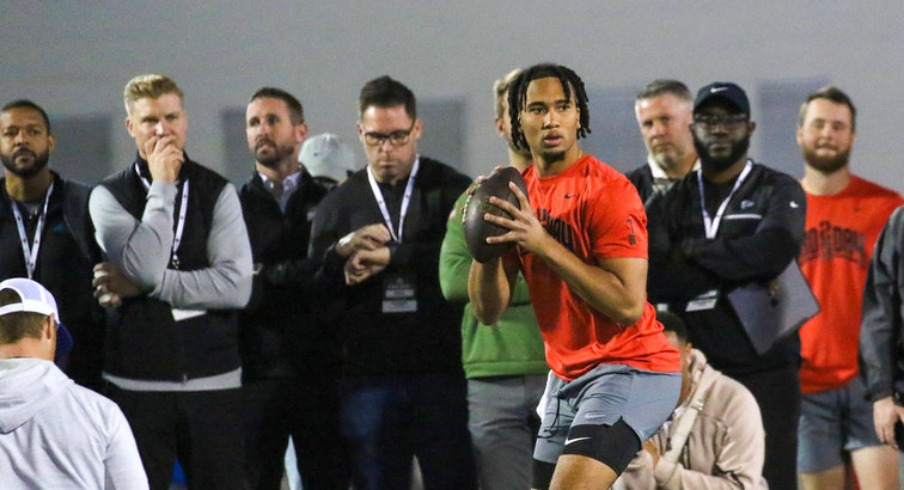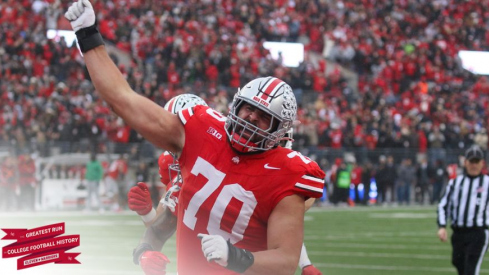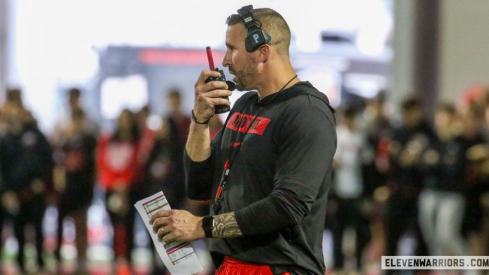"People who boast about their IQ are losers." - Stephen Hawking
Once upon a time, there was a college quarterback who was very, very, very good.
Among the elite, five-star athletes of his nationally beloved, top-ranked team, he was the best of them all; throwing footballs into windows the size of a ham sandwich and scoring touchdowns by the barrelful. Though he was more known for his performances in losses than in wins, there was no denying that he was truly a smart guy, great teammate, and an incredible football player.
Or was there? Because despite dozens of games and hundreds upon hundreds of passes to analyze, NFL executives had also given lots of money to a company that claimed to offer a foolproof way to figure out if a player was Actually Good, and our friend the college quarterback didn't do so well on their test. Cue weeks of handwringing about who and where and how he should be drafted, that eventually amounted to nothing as he was taken with the second pick of the NFL Draft anyway.
And then he went on to be a Rookie of the Year, win double the games expected of his woebegone team, and then lead them to an unexpected playoff victory.
Test destroyed, no one ever relied on junk science ever again, the end.
I don't have the burden of making multimillion dollar decisions, which is a good thing, because I often blanch with terror at having to choose between salmon and a burger at Bob Evans.
But on the other hand, I have a pretty good method for figuring out which one of those things I want: I simply look at the item on menu and go "oh yeah, that looks good" before ordering what I want. What I don't do is overcomplicate a relatively easy decision by subjecting my choices to a ridiculous battery of tests that ultimately tells me nothing important about what I actually need.
I just get the damn burger like a normal person, because who the hell is ordering fish at a Bob Evans anyway?
The S2 test orders the fish.
It looks around the table and demands that everyone else orders the fish, because look, it's done a thorough statistical analysis of the salmon, and because y=p(tan)^3 plus the yaw of the rectangular fourthwise side of the fillet, it is clearly the better choice, and anyway the burger is probably gross and bad. Get the fish!
Or don't get the fish. Just watch C.J. Stroud highlights for 25 minutes and eat the damn burger.
The Athletic has a fun article about the S2 test and Stroud's dismissal of it (in more than one way). But as a longtime educator I have to say that my favorite part about this whole thing is NFL dudes finding out in real time things that actual teachers have known since Socrates slammed a scantron answer sheet down in front of Plato and told him he had 60 minutes to answer 75 questions about featherless bipeds:
“When he took it, was he tired? Was he choosing not to give it his best? Was he nervous? Had he taken a million other tests that day? There’s a whole host of factors.”
Woah, hang on! You're telling me that standardized testing is impacted, potentially critically so, by external factors? That maybe placing an overemphasis on tests as a measure of value is really just a symptom of a society looking for ways to codify preconceptions about intelligence and ability instead of trying to understand the inherent value in an individual?
Get the hell out of here! What am I going to brag to my coworkers about 20 years after I take the test?!
Is the S2 test bad at evaluating potential athletic performance? Maybe! But my guess is that the creators of that system don't have much more of an idea about how accurate it is for that purpose than I do. And, I suspect, that it isn't all that much more valuable than the Wonderlic before it.
I want to go back to that Stephen Hawking quote. He said that in an interview with Piers Morgan (a guy who has almost certainly bragged about his IQ score to other people) after a question about who the most "intelligent" person in the world is. Hawking was smart enough to know how stupid that question was, because there are many, many different ways that you can measure intelligence and ability.
To be clear, there's nothing wrong with NFL teams trying to assess this. I don't think that all draft evaluation is bunk, or that there isn't any value in interviewing a player before handing them a 15 million dollar paycheck. Cade Stover getting asked about his blocking ability is absolutely fair. Maybe someone should come up with some follow-ups for Tyler Owens about this whole "space isn't real" thing. Hell, even asking Stroud about this would've been a great idea for any team:
Stroud had told The Athletic last fall that there are "some things I apply myself to, some things I don't." He explained he did well in school, but described himself as "lazy" in the classroom and that he would "get what I could get so I could play football."
But the problems begin when these organizations start believing that they can glean some previously undiscovered insight into a person thanks to insane questions about if a player thinks his mom is hot or if they're really excited to smoke crack, or via a test that seems suspiciously similar to the same one that I have to do at my optometrist's office to check for macular degeneration.
Beyond normal interview stuff to make sure that the player isn't a lunatic, I'm begging teams: just watch the film! Just watch the freakin' film, because anyone who did so could've told you that C.J. Stroud was going to absolutely tear it up in the NFL. The Texans ultimately made the right choice, but only after months of performative handwringing designed to give legitimacy to a stupid system of evaluation.
Quit overcomplicating this, and especially quit overcomplicating this by giving anyone offering admittedly limited information that much sway in your decision making.
"You must know baby now it's only you, only you
I guess I'm dumb but I don't care"


